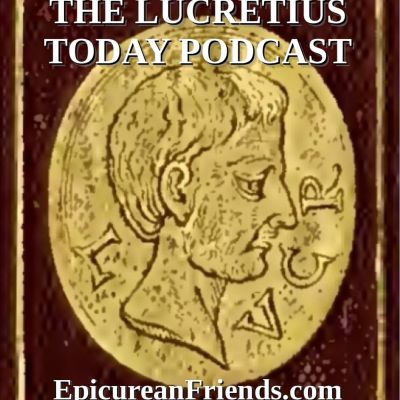Lucretius Today is a podcast dedicated to learning Epicurean philosophy through study of the poet Lucretius, who lived in the age of Julius Caesar and wrote "On The Nature of Things," the only complete presentation of Epicurus' ideas left to us from the ancient world. We'll walk you line by line through the six books of Lucretius' poem, and we'll discuss how Epicurean philosophy can apply to you today. In this podcast we won't be talking about modern political issues. How you apply Epicurus in your own life is entirely up to you. Over at the Epicureanfriends.com web forum, we apply this approach by following a set of ground rules we call "Not Neo-Epicurean, But Epicurean." Epicurean philosophy is not a religion, it''s not Stoicism, it's not Humanism, it's not Libertarianism, it's not Atheism, and it's not Marxism or any other philosophy - it is unique in the history of Western Civilization, and as we explore Lucretius's poem you'll quickly see how that is the case. The home page of this podcast is LucretiusToday...
http://Epicureanfriends.com
Episode 134 - Letter to Menoeceus 01 - Context and Opening of the Letter
Welcome to Episode One Hundred Thirty-Four of Lucretius Today. This is a podcast dedicated to the poet Lucretius, who wrote "On The Nature of Things," the only complete presentation of Epicurean philosophy left to us from the ancient world. I am your host Cassius, and together with our panelists from the EpicureanFriends.com forum, we'll walk you through the ancient Epicurean texts, and we'll discuss how Epicurean philosophy can apply to you today. We encourage you to study Epicurus for yourself, and we suggest the best place to start is the book "Epicurus and His Philosophy" by Canadian professor Norman DeWitt.
If you find the Epicurean worldview attractive, we invite you to join us in the study of Epicurus at EpicureanFriends.com, where you will find a discussion thread for each of our podcast episodes and many other topics. Today we begin our discussion of Epicurus' Letter to Menoeceus. Now let's join Kalosyni reading today's text:
Bailey:
[122] Let no one when young delay to study philosophy, nor when he is old grow weary of his study. For no one can come too early or too late to secure the health of his soul. And the man who says that the age for philosophy has either not yet come or has gone by is like the man who says that the age for happiness is not yet come to him, or has passed away. Wherefore both when young and old a man must study philosophy, that as he grows old he may be young in blessings through the grateful recollection of what has been, and that in youth he may be old as well, since he will know no fear of what is to come. We must then meditate on the things that make our happiness, seeing that when that is with us we have all, but when it is absent we do all to win it.
